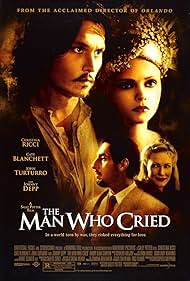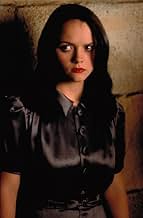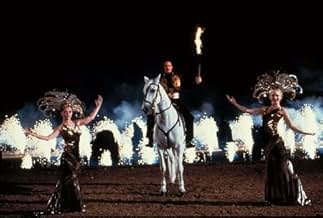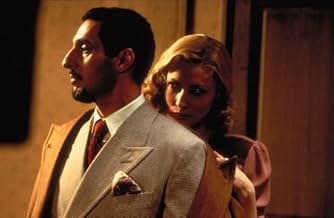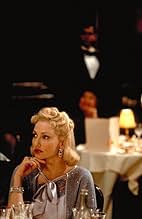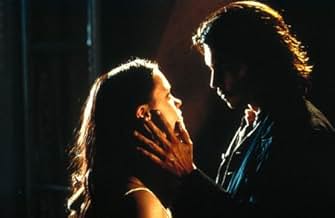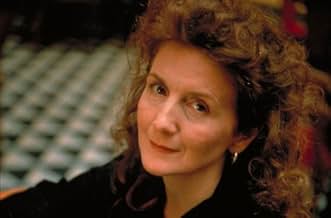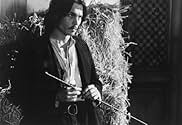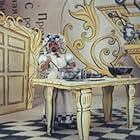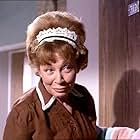A young refugee traveling from Russia to America in search of her lost father falls for a gypsy horseman.A young refugee traveling from Russia to America in search of her lost father falls for a gypsy horseman.A young refugee traveling from Russia to America in search of her lost father falls for a gypsy horseman.
- Director
- Writers
- Stars
- Awards
- 3 wins & 3 nominations total
- Director
- Writers
- All cast & crew
- Production, box office & more at IMDbPro
Featured reviews
Christina Ricci sings more than she speaks in the movie, but she manages to hold your attention nevertheless for a pretty solid hour and a half in this well-acted and profound, but uneven period piece. Sally Potter, who also directed the similarly problematic "Orlando", clearly has the visual and thematic talent to be a much better respected director than she is - she just needs to learn how to tell a story.
The first forty minutes of the film, which begins in the year 1927, are absolutely masterful. The sublime Claudia Lander-Duke plays young Fegele, an impoverished Russian-Jewish girl whose beloved father decides to journey to America in search of a better life. After that, Fegele and her family are set upon by unnamed bad guys (probably either Cossacks or Communists), and Fegele is separated from them. She ends up on an ocean liner bound for England, where her name is changed to Susan, she is adopted by an English family that doesn't understand her, and she is forced to begin the process of assimilation.
Flash forward ten years or so (Potter is regrettably and consistently unspecific about such things). Fegele (now Suzie and now played by Christina Ricci, she of the large, expressive eyes) wants to be a showgirl so she can earn money to go to America and find her father. She auditions and is accepted by a group based out of Paris. Once in Paris, she rooms and becomes tight with fellow showgirl Lola (Cate Blanchett), a somewhat vapid and materialistic creature with no ambition save that of landing a rich man - which she manages to do in the form of opera singer and Mussolini supporter Dante Dominio (John Turturro, in one of his better performances). Around the same time, Suzie meets and falls in love with Cesare (Johnny Depp), the leader of a band of gypsies.
Once all the dominoes are in place, Potter wastes no time in knocking them down. You can see trouble coming a mile away: Lola, Suzie's one confidant who is aware of her Jewish ancestry, begins falling under the emotional and political spell of anti-Semitic, gypsy-hating fascist Dante. Meanwhile, the Nazis have invaded Poland and, despite everyone's self-assured predictions that they'll stop there, the French border is neither geographically nor historically distant. Suddenly, it's a race against time for all involved, but especially for Suzie - will she stay behind with her gypsy king, or, given a choice, will she escape certain death? The problem with all of this is that it's all so familiar. Potter adds nothing to the old story. There are some wonderful messages in this film about multiculturalism, nationalism, and the sometimes subtle nature of fascism, but if you don't care about the story you're not going to be interested in listening to the messages. The gypsy subplot, for instance, seems tacked on, like it was an excuse to give Ricci a love interest and have him be played by Johnny Depp.
The really interesting plot line here involves Lola and Dante, and I would pay ten dollars to see a movie that was just about them. Both Blanchett and Turturro create real, flesh-and-blood human beings, and it's in their scenes that Potter's writing really soars. Watching Dante sink deeper and deeper into a political philosophy fueled by his own insecurity while the irrepressibly optimistic Lola tries to turn a blind eye to it all is a fascinating and marvelous experience.
Ricci gives a good performance too, although occasionally that Valley Girl tone she uses in most of the rest of her movies slips out a little too much here and there. Fortunately, Potter doesn't give the shy, quiet Suzie very much to say. Most of her acting is done with her eyes, and she's really quite good. Johnny Depp does what he can with Cesare, but there's only so much an actor can accomplish when playing a plot device.
Art direction, music, and cinematography were all top-drawer. As is par for the course with Sally Potter's films, it looked good and had some interesting things to say. I just wish it had been more compelling.
The first forty minutes of the film, which begins in the year 1927, are absolutely masterful. The sublime Claudia Lander-Duke plays young Fegele, an impoverished Russian-Jewish girl whose beloved father decides to journey to America in search of a better life. After that, Fegele and her family are set upon by unnamed bad guys (probably either Cossacks or Communists), and Fegele is separated from them. She ends up on an ocean liner bound for England, where her name is changed to Susan, she is adopted by an English family that doesn't understand her, and she is forced to begin the process of assimilation.
Flash forward ten years or so (Potter is regrettably and consistently unspecific about such things). Fegele (now Suzie and now played by Christina Ricci, she of the large, expressive eyes) wants to be a showgirl so she can earn money to go to America and find her father. She auditions and is accepted by a group based out of Paris. Once in Paris, she rooms and becomes tight with fellow showgirl Lola (Cate Blanchett), a somewhat vapid and materialistic creature with no ambition save that of landing a rich man - which she manages to do in the form of opera singer and Mussolini supporter Dante Dominio (John Turturro, in one of his better performances). Around the same time, Suzie meets and falls in love with Cesare (Johnny Depp), the leader of a band of gypsies.
Once all the dominoes are in place, Potter wastes no time in knocking them down. You can see trouble coming a mile away: Lola, Suzie's one confidant who is aware of her Jewish ancestry, begins falling under the emotional and political spell of anti-Semitic, gypsy-hating fascist Dante. Meanwhile, the Nazis have invaded Poland and, despite everyone's self-assured predictions that they'll stop there, the French border is neither geographically nor historically distant. Suddenly, it's a race against time for all involved, but especially for Suzie - will she stay behind with her gypsy king, or, given a choice, will she escape certain death? The problem with all of this is that it's all so familiar. Potter adds nothing to the old story. There are some wonderful messages in this film about multiculturalism, nationalism, and the sometimes subtle nature of fascism, but if you don't care about the story you're not going to be interested in listening to the messages. The gypsy subplot, for instance, seems tacked on, like it was an excuse to give Ricci a love interest and have him be played by Johnny Depp.
The really interesting plot line here involves Lola and Dante, and I would pay ten dollars to see a movie that was just about them. Both Blanchett and Turturro create real, flesh-and-blood human beings, and it's in their scenes that Potter's writing really soars. Watching Dante sink deeper and deeper into a political philosophy fueled by his own insecurity while the irrepressibly optimistic Lola tries to turn a blind eye to it all is a fascinating and marvelous experience.
Ricci gives a good performance too, although occasionally that Valley Girl tone she uses in most of the rest of her movies slips out a little too much here and there. Fortunately, Potter doesn't give the shy, quiet Suzie very much to say. Most of her acting is done with her eyes, and she's really quite good. Johnny Depp does what he can with Cesare, but there's only so much an actor can accomplish when playing a plot device.
Art direction, music, and cinematography were all top-drawer. As is par for the course with Sally Potter's films, it looked good and had some interesting things to say. I just wish it had been more compelling.
The film, though highly predictable, is not anywhere near as bad as people make it out to be. It's not boring unless your attention span is that of the typical Hollywood absorbed moron. The acting isn't anything worse than the typical product of that filmworld - though it is slightly better. The story, also, is not a completely typical waste. Now that I've mentioned all of these things about the typical, that is unfortunately exactly what this film is: extremely typical beyond comprehension. Everything, down to the lame, supposedly romantic, slow motion scene of Johnny Depp riding his horse, has been done 3049090348 hundred thousand times before. Most of the story makes a remote amount of sense, except that the Russian soldiers who force Ricci's family to leave Russia for some reason that I must have missed are peaking Polish. Well, in the end, since the composition is pretty interesting, and the music is great, it is worth seeing - unless you have no idea about these things and would rather watch Bruce Willis blow things up.
I was in San Francisco and decided to see an "artsy" film. I bought tickets to this movie and was quite impressed, even though I am usually a fan of movies like The Terminator and Armageddon. The movie takes place around 1927 with a young girl named Feglee playing with her dad in the field. He soon gets drafted and soon sends for his daughter. She ends up getting put onto the wrong boat and ends up in Paris where she is re-named Suzie. The young girl soon morphs beautifully into Christina Ricci who makes friends with the smart and sexy Lola (Cate Blanchett). They get jobs as Opera singers and the both of them find love. Lola, with the main Opera Singer named Dante, and Suzie with a gypsy named Cesar, who takes care of the horses. Dante finds out that Suzie is Jewish and ends up telling people, which would put her in danger. So Suzie must decide whether she should flee and go to America to find her father or stay with Cesar. I was truly surprised that I could enjoy a movie like this. Of course this movie has some slow parts, but which movie doesn't? And the performances were truly outstanding. An unrecognizable Cate Blanchett and Johnny Depp seriously were in their characters. But the movie belongs to Christina Ricci. I have seen her play a rebel-type explosives expert, a seductive pregnant 16 year old, a mischievous young teen, a b*tchy lawyer, a perky sorority sister, a freaked out laundry mat owner, Wednesday Addams etc. And now here she is taking on another challenging role as a quiet English accent- opera singer. This movie is really good, and the ONLY other romantic movie I enjoyed was Titanic. (***1/2 out of ****)
First of all, try to avoid the trailer before watching the movie if you can. The Man Who Cried is about a young Jewish girl living in Russia in the late twenties who has to flee her home country and eventually ends up in Paris as a young adult just before the onset of World War II. She gets involved with a cabaret showgirl played by Cate Blanchett, an Italian opera singer played by John Turturro and a gypsy man played by Johnny Depp. I found the movie slow-moving but not boring. It had a certain melancholy to it where almost everything was restrained and understated. There are dramatic moments but no big melodrama which honestly I kinda missed. I wasn't particularly touched nor did I cry or even get teary-eyed. Your own mileage might vary, but I don't think it's a big tear-jerker.
There's a lot of music (mostly opera but not usually the bombastic cliché kind) in this film with two important recurring songs. They're quite beautiful especially the french song "Je crois entendre encore" which weirdly I didn't recognize as French despite it being my native language. The songs are important because they often convey the emotions felt instead of words. It doesn't really matter that you don't understand the words. As an historical drama, it mostly skirts big events, mostly focusing on their effects on our characters from different nationalities. You need some minimal historical background to get what is happening. The whole first part with the exile of the little girl was pretty gripping. She seemed so small and vulnerable. The romantic aspect was two-fold. The relationship between Cate Blanchett and John Turturro's characters was very interesting but not romantic. The relationship between Christina Ricci and Johnny Depp's characters was less interesting but more romantic.
Johnny Depp doesn't say much but his presence is felt. He was born to play sexy gypsy men and I suspect most women will "swoon" over him ;) The other performances were fine with the stand-out being Cate Blanchett as a somewhat superficial Russian dancer trying to marry into richness. The songs were mostly lip-synched. I think they were done very well but still it disturbed somewhat my suspension of disbelief. In conclusion, I liked watching it, it was well made with strong actors but the story could have been told a little better to engage the viewer more emotionally. It didn't strike me as particularly memorable or as the highlight of any of these actor's resumes.
Rating: 6.5 out of 10 (good)
There's a lot of music (mostly opera but not usually the bombastic cliché kind) in this film with two important recurring songs. They're quite beautiful especially the french song "Je crois entendre encore" which weirdly I didn't recognize as French despite it being my native language. The songs are important because they often convey the emotions felt instead of words. It doesn't really matter that you don't understand the words. As an historical drama, it mostly skirts big events, mostly focusing on their effects on our characters from different nationalities. You need some minimal historical background to get what is happening. The whole first part with the exile of the little girl was pretty gripping. She seemed so small and vulnerable. The romantic aspect was two-fold. The relationship between Cate Blanchett and John Turturro's characters was very interesting but not romantic. The relationship between Christina Ricci and Johnny Depp's characters was less interesting but more romantic.
Johnny Depp doesn't say much but his presence is felt. He was born to play sexy gypsy men and I suspect most women will "swoon" over him ;) The other performances were fine with the stand-out being Cate Blanchett as a somewhat superficial Russian dancer trying to marry into richness. The songs were mostly lip-synched. I think they were done very well but still it disturbed somewhat my suspension of disbelief. In conclusion, I liked watching it, it was well made with strong actors but the story could have been told a little better to engage the viewer more emotionally. It didn't strike me as particularly memorable or as the highlight of any of these actor's resumes.
Rating: 6.5 out of 10 (good)
The athmosphere in this film is created by using rich textures and suggestions of scent. It is carried to the audience by heart wrenching music, which touches all senses, enabling the viewer to fill their soul with unearthly beauty. In the wealth of sound and scenes, which are full of symbolism, words become unnecessary, the actors secondary and the direction, supreme. Pure theatre.
Storyline
Did you know
- TriviaChristina Ricci and Johnny Depp found it strange and amusing to do sex scenes with each other because they first met when she was 9 and he was 26, when he visited the set of her debut film Mermaids (1990) to see his then-girlfriend Winona Ryder. She said during an interview with ABC News, "I've known Johnny so long, he's protective of me as an older brother and it's weird to think of having sex with him. So we know enough about each other to laugh at it. He said it was 'like we were rooting around together like pigs.' Anyway, I don't think you ever really deal with sexuality on-screen. There are, like, 50 people watching you, and you're just, like, 'Uh, I hope my ass looks good.' There's no deep feeling there. It's just embarrassing."
- GoofsIn the scene where Suzie is following Cesare and his friends on her bike, they go through a passage where you can see the Eiffel Tower in the background and it is lit up. However, the lights were not added to the Tower until 1986.
- SoundtracksJe crois entendre encore (Yiddish Version)
from "The Pearl Fishers"
by Georges Bizet
Performed by Salvatore Licitra and Orchestra of the Royal Opera House
Concertmaster Vasko Vassilev
- How long is The Man Who Cried?Powered by Alexa
Details
- Release date
- Countries of origin
- Official site
- Languages
- Also known as
- Людина, яка плакала
- Filming locations
- Paris, France(on location)
- Production companies
- See more company credits at IMDbPro
Box office
- Gross US & Canada
- $747,092
- Opening weekend US & Canada
- $93,455
- May 27, 2001
- Gross worldwide
- $1,322,763
- Runtime1 hour 40 minutes
- Color
- Sound mix
- Aspect ratio
- 1.85 : 1
Contribute to this page
Suggest an edit or add missing content

